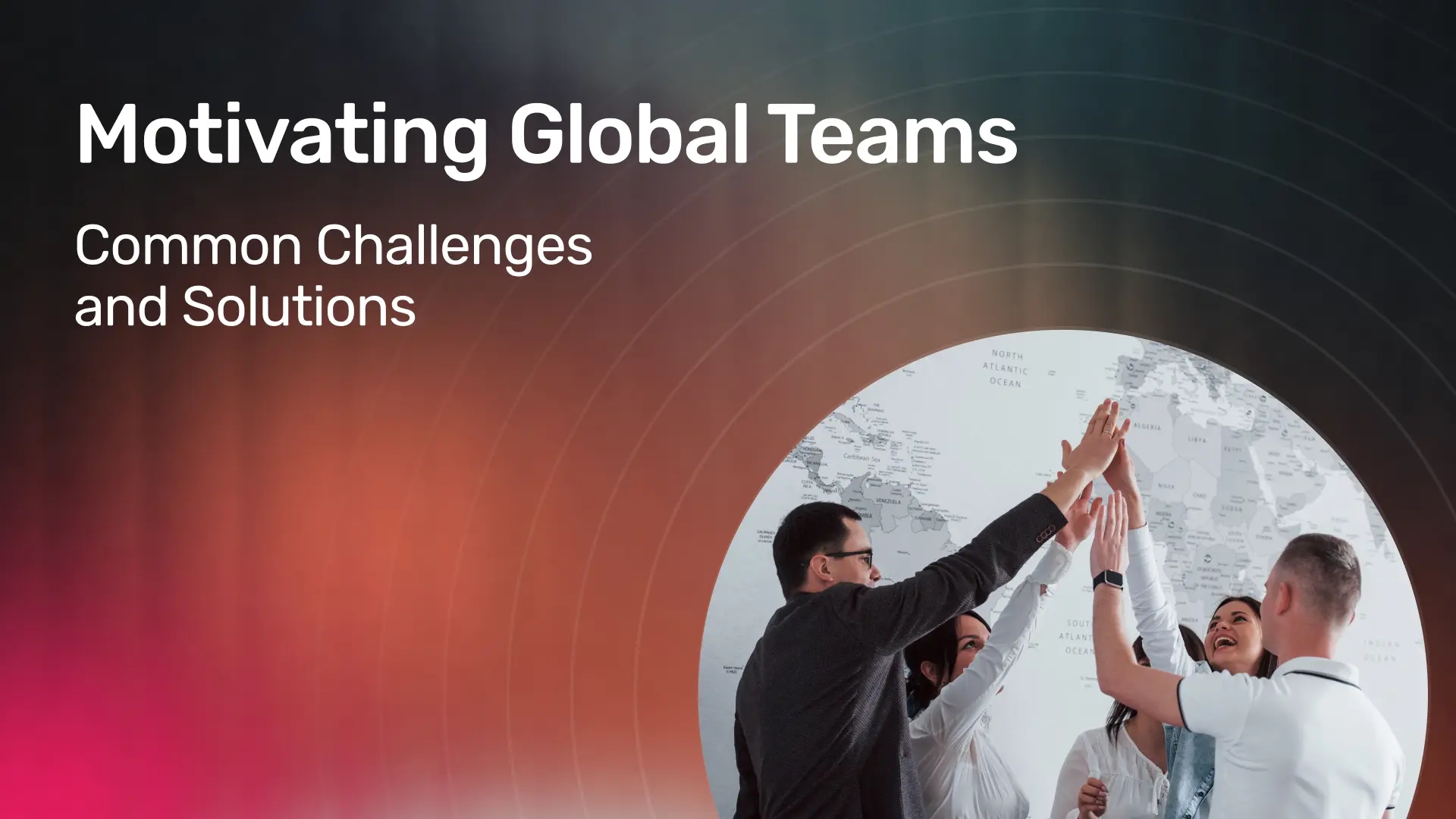Motivating Global Teams: Common Challenges & Solutions
In an era where remote work and digital collaboration have become the norm, global teams are more prevalent than ever. While they offer businesses access to diverse talent and fresh perspectives, they also come with unique challenges. Successfully motivating a distributed workforce requires strategic leadership, effective communication, and the right tools. In this article, we explore common obstacles in managing global teams and provide actionable solutions to foster engagement, trust, and productivity.

The rise of global teams and their importance
In today’s interconnected world, businesses increasingly adopt global teams to leverage diverse skill sets, perspectives, and expertise. Remote work, digital transformation, and access to international talent pools have made global teams an essential part of many organisations. Companies with global teams benefit from broader market insights, operational flexibility, and increased innovation. However, managing and motivating a workforce spread across different time zones, cultures, and working styles presents unique challenges.
Despite these challenges, global teams play a crucial role in business success. As Harvard Business Review explains in Global Teams That Work, they enable companies to scale efficiently, reduce costs by hiring talent across regions, and foster a diverse work environment that drives innovation. Additionally, global teams provide companies with a strategic advantage in accessing emerging markets, staying competitive, and building a strong international presence. Organisations that successfully navigate these challenges gain a significant edge, enjoying improved productivity, enhanced innovation, and stronger collaboration.

Common challenges in motivating global teams
While global teams offer numerous benefits, they also face obstacles that can hinder performance and engagement. Below are some of the most common challenges organisations face in managing international workforces.
Cultural differences and work ethics
Diverse cultural backgrounds bring varying perspectives and approaches to work. Work ethics, attitudes towards hierarchy, and communication styles differ from one culture to another. In some cultures, direct communication is encouraged, while in others, indirect and nuanced communication is the norm. Similarly, approaches to feedback, decision-making, and authority vary significantly, creating misunderstandings and friction if not appropriately managed.
To overcome this challenge, businesses must invest in cross-cultural training, encourage open dialogue, and promote cultural awareness among team members. Inspiring leaders should foster an inclusive environment that respects cultural nuances while aligning everyone with common goals and values.
Communication barriers
Effective communication is crucial for any team, but it becomes even more challenging in a global workforce. Language differences, varying communication styles, and reliance on digital tools can create difficulties in conveying messages clearly. Misinterpretations and inefficiencies can arise when employees struggle to understand one another.
Companies can address this by implementing clear communication protocols, using simple and concise language, and encouraging asynchronous communication where possible. Tools such as AI-powered translation services, real-time transcription, and well-structured documentation can help bridge language gaps.
Lack of trust and connection
When employees are geographically dispersed, building personal relationships and a sense of belonging can be challenging. Without regular face-to-face interactions, trust issues may develop, leading to disengagement and reduced collaboration. Employees may feel isolated, which can negatively impact team morale and overall performance.
To foster trust, organisations should prioritise virtual team-building activities, encourage open discussions, and create spaces where employees can engage informally. Regular video calls, virtual meet-ups, and mentorship programmes can help bridge the gap and create a stronger sense of connection.
Time zone differences
Coordinating meetings, deadlines, and projects across multiple time zones can be frustrating. Employees in certain locations may feel isolated or at a disadvantage if they are constantly working outside of regular hours to accommodate others. Time zone differences can lead to communication delays and slow decision-making processes.
Organisations should establish clear policies for scheduling meetings, ensuring fairness in rotating time slots to avoid favouring specific regions. Utilising asynchronous work methods and providing flexible work hours can help employees maintain work-life balance while staying engaged.
Performance management challenges
Monitoring productivity, setting clear expectations, and evaluating performance can be more complex in a remote setting. Without proper tools and structures in place, ensuring accountability and fairness becomes difficult. Employees may feel uncertain about their performance metrics and lack opportunities for career development.
To tackle this issue, companies should implement structured performance tracking systems, set transparent goals, and provide regular feedback. Using data-driven performance assessment tools and offering professional growth opportunities can enhance motivation and productivity.
Technology and connectivity issues
Reliance on digital tools for communication and collaboration means that technical issues, slow internet connections, and incompatible platforms can disrupt workflows and frustrate team members. Ensuring that all employees have equal access to the necessary technology is crucial for seamless operations.
Providing IT support, investing in high-quality collaboration tools, and maintaining a centralised knowledge-sharing platform can mitigate these challenges. Encouraging employees to report technical difficulties promptly allows businesses to address them efficiently.
Other challenges to discover
As global teams evolve, new challenges may emerge, such as regulatory compliance, security concerns linked to cyber threat intelligence, and employee burnout from remote work. Companies must stay agile and responsive to these issues, regularly reviewing and updating policies to support their teams effectively.

Effective solutions for motivating global teams
To overcome these challenges and create a highly motivated global team, organisations must adopt strategic solutions that foster engagement, trust, and productivity.
Foster a strong company culture
A well-defined company culture that transcends geographical boundaries can help align team members with shared values and goals. Reinforcing company culture through regular communication and leadership commitment ensures employees feel connected and valued.
Encourage collaborative work
Leveraging collaboration tools such as project management software, virtual whiteboards, and cloud-based platforms enables team members to work together seamlessly. Encouraging cross-functional projects helps bridge gaps between different regions and departments. Also, in companies with diverse cultures, collaborative work might open new discussions and result in more successful practices. In a Forbes article, it is mentioned that while they might have gone with a different route, “a team in Europe might employ sustainable practices that inspire a similar practice in Asia, leading to mutual learning and improvement.”
Build trust and connection
Creating opportunities for informal interactions, such as virtual coffee breaks, team-building activities, and off-site retreats, helps strengthen relationships and foster trust among team members.
Promote engagement and inclusion
Recognising and celebrating diverse cultural backgrounds through events, appreciation programmes, and inclusive policies ensures that every team member feels respected and valued. Encouraging open dialogue about inclusivity fosters a positive work environment.
Regular feedback and communication
Implementing structured check-ins, performance reviews, and transparent communication channels helps maintain alignment and accountability. Encouraging feedback from employees fosters a culture of continuous improvement.
Address technological challenges
Investing in reliable technology, providing IT support, and ensuring that employees have access to the right tools can eliminate productivity barriers. Choosing user-friendly platforms that integrate seamlessly can enhance workflow efficiency. Besides, signing up for IT outsourcing services can help maintain global infrastructure, manage cybersecurity, and provide round-the-clock technical support.
Embrace flexible leadership
Leaders of global teams must adapt their management styles to suit diverse needs. A flexible approach that accounts for cultural nuances, individual preferences, and evolving work dynamics leads to better team engagement.
Utilise AI and automation to reduce workload
Automation tools and AI-driven solutions can help streamline repetitive tasks, improving efficiency and reducing employee burnout. AI-driven analytics also offer insights into team performance, enabling better decision-making.
Other solutions to explore
Organisations should continually explore new strategies, such as employee wellness programmes, customised learning opportunities, and mentorship initiatives, to further enhance motivation and job satisfaction.
Read more on successful global teams: Successful Global Teams - Trends, Challenges and Solutions

The benefits of a motivated global team
When organisations successfully motivate their global teams, they reap many benefits that drive long-term success.
Increased productivity
A motivated global team operates with a sense of purpose and commitment. This translates directly into higher productivity. When employees feel valued and their contributions are recognized, they are more likely to invest their energy and focus into their tasks. Motivation fosters a proactive approach, where team members anticipate challenges and take initiative rather than waiting for instructions. This results in smoother workflows and faster project turnaround times.
Enhanced innovation and creativity
Global teams are inherently diverse, bringing together individuals with varied backgrounds, experiences, and perspectives. When these diverse viewpoints are encouraged and valued, it creates a fertile ground for innovation. Motivation plays a crucial role in empowering employees to share their ideas and take calculated risks. A culture of psychological safety, where individuals feel comfortable expressing themselves without fear of judgment, is essential for fostering creativity. By encouraging collaboration and open communication, organisations can tap into the collective intelligence of their global teams. This can lead to the development of groundbreaking products, services, and solutions that cater to diverse markets.
Improved employee satisfaction
A motivated workforce is a satisfied workforce. When employees feel appreciated, respected, and empowered, they are more likely to experience job satisfaction.
High employee satisfaction translates into lower turnover rates, which reduces recruitment and training costs. Retaining talented employees also preserves valuable institutional knowledge and expertise. A positive work environment that prioritises employee well-being and motivation enhances the organisation's employer brand. This makes it easier to attract and retain top talent in a competitive global market. Providing opportunities for professional development and growth is also a key component of employee satisfaction. When employees feel that their company is invested in their future, they are more likely to be motivated and engaged.
Stronger team collaboration
Motivation fosters a sense of shared purpose and camaraderie among team members. This leads to improved communication, trust, and cooperation. Motivated teams are more likely to engage in effective communication, even across geographical and cultural boundaries. They are more adept at using technology and other tools to facilitate collaboration. When team members trust each other, they are more willing to share information, provide support, and work together to overcome challenges. This leads to better decision-making and problem-solving.

Conclusion
By addressing the challenges faced by global teams and implementing effective motivational strategies, organisations can build a dynamic, engaged, and high-performing workforce. A motivated global team fosters innovation, improves productivity, and strengthens collaboration, ensuring long-term success in an increasingly competitive business landscape.
